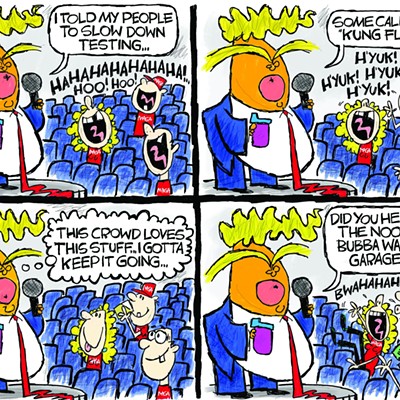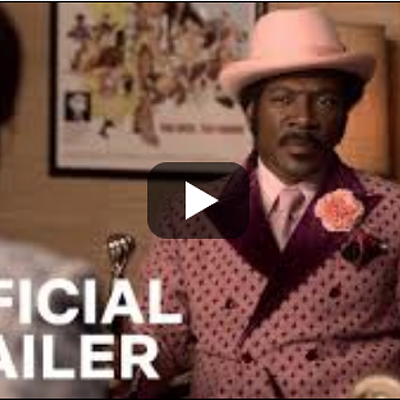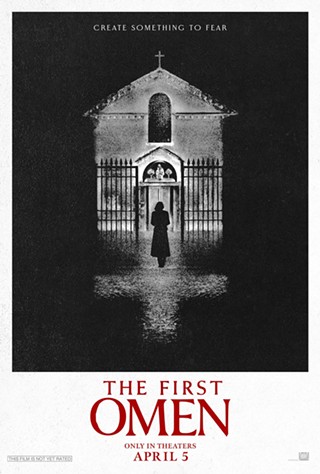Written by the actual person Charlie Kaufman and his fictional twin brother Donald, Adaptation is a story about Susan Orlean, who wrote a real book called The Orchid Thief. Assigned the task of adapting it for the screen, Charlie Kaufman finds that the fictional Susan Orlean is much more interesting than the real Susan Orlean, and that he can't quite adapt the book without frequently stopping to masturbate.
Nicolas Cage plays Charlie Kaufman and his brother Donald. Charlie Kaufman wrote the real parts of the screenplay, adapting for the screen the story of his attempt to adapt the book to the screen. Donald Kaufman wrote the fictional part of this movie, which was easy for him, because he doesn't actually exist.
Charlie and Donald live in Charlie's lovely Hollywood home, which is somewhere between Mulholland Drive and Charlie Kaufman's imagination. Donald, who isn't real, is a successful human being insofar as he can make friends, talk to people, and generally carry on the social aspects of a human life. Charlie on the other hand, is only successful at screenplay writing.
So Donald, perhaps jealous of Charlie, who is actually Donald, since Donald isn't real, but is an imaginary version of Charlie that Charlie made so that Charlie could be jealous of himself, and, conversely, so that he could be jealous of himself (i.e. his other self, the one that's not real but is socially apt) takes a screenwriting course with real screenwriting course teacher Robert McKee, who is played by Brian Cox, thus making him fictional.
Except Robert McKee, the real Robert McKee, in the real world, now claims on his website that he was the teacher of the writer of the movie Adaptation, i.e. of Donald Kaufman, only there isn't really a Donald Kaufman, so the real Robert McKee is now teaching fictional people how to write real movies.
Which means that the movie, Adaptation, which is based on the real world, is now the basis of the reality that Robert McKee thinks is real. So, reality is based on a movie.
Which isn't entirely pertinent to the film, except that that's exactly the kind of thing that this sort of film would like to have happen, if films could actually like things, which seems vaguely possible. In fact, the theoretician of film David Johnston thinks films actually have intentions, but that's neither here nor there, except that I'm sure that the real Charlie Kaufman would agree.
So in the film Adaptation Charlie Kaufman, the fictional character played by Nicolas Cage, who has an Elvis fetish so enormous that he married Elvis's actual daughter, which is the kind of confusion that his character, Charlie Kaufman, would hate, but which the writer Charlie Kaufman would probably enjoy, is adapting the book Orchid Thief for the screen. In doing so, he becomes obsessed with its author, Susan Orlean, who is a character in the book, because the book is supposed to be the true story of Susan Orlean's encounters with John Laroche, who thieves orchids.
Having written herself into her book, Susan Orlean (Meryl Streep) finds that she can't quite get out of it, and the character Laroche keeps calling her back. Now, of course, Laroche is a real person, but in writing him Orlean has made him a fictional character, and Charlie Kaufman, in adapting him for the screen, has made him even more fictional, or has fictionalized the fictionalized character who in the real world stole orchids.
Except that Charlie is having no luck at this, because, in spite of saying that he loves the book, he also finds that it has no narrative arc, no character development, no sudden revelations, i.e. nothing that makes a movie a movie, and which distinguishes a movie from real life, which never has these things.
Or maybe it's just Charlie's life that never has these things. In trying to find out, he decides to let Donald, his fictional brother, work on his screenplay with him. Donald steps into the plotless mess that Charlie has written and finds a way to inject into it all the things that Charlie hates, those things being, in essence, the elements of drama.
Which means that Susan Orlean and John Laroche, who are the kind of characters one would find in, as Charlie puts it "exactly the kind of crap that the New Yorker would print," suddenly come to life. Which is to say, they acquire fictional lives, because real lives never really come to life.
Does all this work as a movie? No, thank God. It just plain works. In fact, in eschewing drama, and then accepting it, Kaufman has written a film that has all the elements of drama while making those elements the characters of the film. Tension, story arc, revelation and plot fight it out on screen and usurp the role of the characters, tossing them aside as accidental dross, and then rescuing them and making them real by giving them the kinds of things that only happen in film.
Also, Meryl Streep and Nicolas Cage, two crappy actors who are considered great actors, give perfectly campy performances, which is probably just right for this sort of thing.
So if you're interested in seeing why pretentious movies don't work, and then seeing how they could, if they would just give up their pretensions, and you don't mind a movie that has a mind of its own, you should go see Adaptation before somebody makes a novelization of it and the whole world collapses into impossible self-reference.













